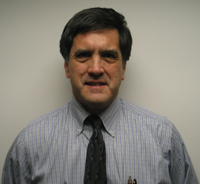 UNMC researcher Keith Mueller, Ph.D., answers questions about his work, life and interests.
UNMC researcher Keith Mueller, Ph.D., answers questions about his work, life and interests.
NOTE: This profile is part of a series highlighting the 25 researchers who were named UNMC Distinguished Scientists for 2006. Each of these researchers will be profiled in UNMC Today leading up to a March 12 ceremony to recognize their achievements.
- Name: Keith Mueller, Ph.D.
- Title: Associate dean for academic affairs in the College of Public Health, professor and section chief, health services research and rural health policy
- Joined UNMC: 1997
- Hometown: Milwaukee
Describe your research in 25 words or less.
My research focuses on the development of public policies that improve health care delivery to vulnerable populations, with special attention to rural places. I examine the impact of policies on local health care providers, such as how changes in Medicare payment policy influence the mix of services offered in rural communities.
How did you decide to pursue this area of research?
My interest in health care delivery began with a project in local government, redesigning an emergency medical service system. I have had opportunities in the past 20 years to bridge two interests — direct involvement in public policy development and scholarly research — because of working in health policy.
When did you realize you were interested in research?
As I was completing a Ph.D. in political science, I realized my primary vocation would be research and the venue through which I could make my contribution to improving public policy.
What are the greatest challenges in research today?
One challenge is maintaining separation between research and reporting or using data for advocacy purposes. The volume of “research” presented to policy makers is overwhelming because so many narrow interests claim that data constitutes research. Our role as research scholars is to maintain the integrity of the research process and the objectivity of our presentation of research results.
Best advice for new researchers?
Keep your focus on two imperatives. First, abide by the principles, methods and purposes of scholarly research. I constantly remind myself and those working with me of the importance of having the patience to complete all phases of a research project, from conceptualization through presentation. Second, conduct research that can make a difference to policy, program or practice. Doing so keeps the researcher energized and enhances the value of the research, which in turn, frankly, increases the likelihood of continued support.
When an experiment stalls, what drives you to continue on?
In public policy research we can be certain that if we persevere we will contribute objective analysis that decision makers cannot get elsewhere.
Who has been your greatest teacher?
I have a hard time singling out any one person, especially since much of my health policy research training came after my Ph.D. in political science. I gained the most under the mentoring of faculty at Johns Hopkins University in a post-doc fellowship, especially from Susan Horn and Gerard Anderson. In my policy work, my greatest mentor has been Charles Fluharty, president of the Rural Policy Research Institute.
Tell us about your family and hobbies outside the lab.
I am a proud grandfather of a girl born in July 2005, our first grandchild. My wife’s family in Chadron is one of the reasons for my interest in rural health delivery, as is my love of hiking in remote areas. I also enjoy recreational bicycling. My wife and I enjoy traveling, experiencing new places and favorite repeat places like Scotland.
Globally, describe the most notable research achievement ever?
If you are asking about my own research, there have been times when projects in which I participated (usually as the PI) have led directly to public policy. The most recent was a change in the regulation implementing access standards in the Medicare Part D drug benefit. In general health services research, the Rand Health Insurance Experiment, which demonstrated the relationship between out-of-pocket expenses and use of services, is the field’s most outstanding contribution.
Clarify a common misconception about research?
Research is not conducted in isolation from practical application.
What would you tell a student interested in a research career?
Welcome to an exciting and rewarding career. Always keep in mind that the most significant advances in society begin as independent research projects. At times it may seem that research takes too long to complete, and that it takes a long time for the research results to make a difference (sometimes longer than researcher’s memory about having done the pioneering work). But each research finding will be a contribution and that should be motivation to press on.